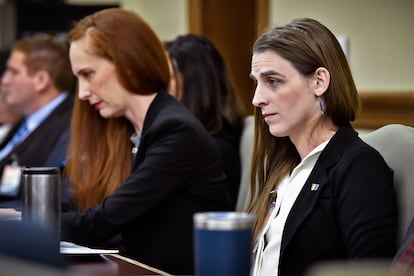Trans lawmaker silenced for second day by Montana House speaker
Democratic Rep. Zooey Zephyr on Friday sought to speak on a bill to prevent minors from seeing porn online, but House speaker Matt Regier blocked the request

A transgender Montana lawmaker was silenced for a second day Friday as her Republican colleagues have refused to let her speak on the chamber’s floor this session until she apologizes for saying lawmakers would have “blood on their hands” if they banned gender-affirming medical care for transgender youth.
Democratic Rep. Zooey Zephyr sought to speak on a bill to prevent minors from seeing porn online, but House Speaker Matt Regier blocked the request.
“I’m still going to expect the same standard for all representatives in this House. I’m still going to stand for the dignity and integrity of this House,” said Regier. He said earlier that the silencing was necessary to “maintain decorum” and will last until the end of the session unless she apologizes.
Regier first shut down Zephyr on Thursday, when she wanted to comment on a bill seeking to put a binary definition of male and female into state code. The speaker also declined to recognize Zephyr later Thursday when she rang in to speak about another bill, which was unrelated to LGBTQ+ issues and seeks to reimburse hotels that provide shelter to victims of human trafficking.
Conservative lawmakers, who are demanding her censure, have also deliberately misgendered her, using male pronouns when referring to her.
“Hate-filled testimony has no place on the House floor,” Republican Rep. Caleb Hinkle, a member of the Montana Freedom Caucus that demanded the censure, said in a statement.
Democrats objected to Regier’s decision, but the House Rules committee and the House have upheld the move on party-line votes, including one on Friday.
“The speaker is refusing to allow me to participate in debate until I retract or apologize for my statements made during floor debate,” Zephyr said.
Zephyr said she stands by what she said about the consequences of banning essential medical care for transgender youth.
The bill would ban transgender minors in Montana from receiving puberty blockers, cross-sex hormones or surgical procedures. Those are treatments for gender dysphoria, the clinically significant distress caused by feeling that one’s gender identity does not match one’s biological sex. Medical professionals who provided such care would lose their medical licenses for at least a year.
“When there are bills targeting the LGBTQ community, I stand up to defend my community,” Zephyr said. “And I choose my words with clarity and precision and I spoke to the real harms that these bills bring.”
Republican Gov. Greg Gianforte has indicated he will sign the bill.
The issue came to a head Tuesday when Zephyr, the first transgender woman to hold a position in the Montana legislature, referenced the floor session’s opening prayer when she told lawmakers if they supported the bill, “I hope the next time there’s an invocation, when you bow your heads in prayer, you see the blood on your hands.”
She had made a similar comment when the House debated the bill the first time.
House Majority Leader Sue Vinton rebuked Zephyr on Tuesday, calling her comments inappropriate, disrespectful and uncalled for.
Later, the Montana Freedom Caucus issued its censure demand in a letter that called for a “commitment to civil discourse,” deliberately misgendering her in the same sentence. The caucus also misgendered Zephyr in a Tweet while posting the letter online.
“It is disheartening that the Montana Freedom Caucus would stoop so low as to misgender me in their letter, further demonstrating their disregard for the dignity and humanity of transgender individuals,” Zephyr said in a statement Wednesday.
Zephyr also spoke emotionally and directly to transgender Montanans in February in opposing a bill to ban minors from attending drag shows.
“I have one request for you: Please stay alive,” Zephyr said then, assuring them she and others would keep fighting and challenge the bills in court.
The legislature has also passed a bill stating a student misgendering or deadnaming a fellow student is not illegal discrimination, unless it rises to the level of bullying. Deadnaming is calling a transgender person by their previous name when they have changed their name as part of their gender transition.
At the end of Thursday’s House session, Democratic Rep. Marilyn Marler asked that the House majority allow Zephyr to speak on the floor going forward.
“This body is denying the representative ... the chance to do her job,” Marler said.
Majority Leader Vinton, before moving for adjournment, said: “I will let the body know that the representative ... has every opportunity to rectify the situation.”
Sign up for our weekly newsletter to get more English-language news coverage from EL PAÍS USA Edition
Tu suscripción se está usando en otro dispositivo
¿Quieres añadir otro usuario a tu suscripción?
Si continúas leyendo en este dispositivo, no se podrá leer en el otro.
FlechaTu suscripción se está usando en otro dispositivo y solo puedes acceder a EL PAÍS desde un dispositivo a la vez.
Si quieres compartir tu cuenta, cambia tu suscripción a la modalidad Premium, así podrás añadir otro usuario. Cada uno accederá con su propia cuenta de email, lo que os permitirá personalizar vuestra experiencia en EL PAÍS.
¿Tienes una suscripción de empresa? Accede aquí para contratar más cuentas.
En el caso de no saber quién está usando tu cuenta, te recomendamos cambiar tu contraseña aquí.
Si decides continuar compartiendo tu cuenta, este mensaje se mostrará en tu dispositivo y en el de la otra persona que está usando tu cuenta de forma indefinida, afectando a tu experiencia de lectura. Puedes consultar aquí los términos y condiciones de la suscripción digital.








































